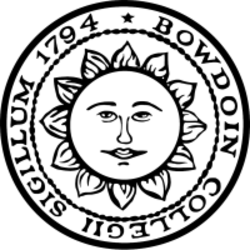Difference between revisions of "Bowdoin College"
m (Text replacement - "|twitter= " to "") |
(unstub) |
||
| Line 3: | Line 3: | ||
|logo=Formal Seal of Bowdoin College, Brunswick, ME, USA.svg | |logo=Formal Seal of Bowdoin College, Brunswick, ME, USA.svg | ||
|constitutes=college | |constitutes=college | ||
| − | |start= | + | |start=1794 |
| − | |headquarters= | + | |headquarters=Brunswick, Maine |
|type=Private | |type=Private | ||
|website=http://bowdoin.edu/ | |website=http://bowdoin.edu/ | ||
|motto=Ut Aquila Versus Coelum | |motto=Ut Aquila Versus Coelum | ||
|motto_translation=Latin | |motto_translation=Latin | ||
| + | |description=From its founding, Bowdoin was known to educate the sons of the political elite and "catered very largely to the wealthy conservative from the state of Maine." | ||
}} | }} | ||
| + | |||
| + | '''Bowdoin College''' is a [[Private college|private]] [[liberal arts colleges in the United States|liberal arts college]] in [[Brunswick, Maine|Brunswick]], [[Maine]]. The college offers 34 majors and 36 minors, as well as several joint engineering programs with [[Columbia University|Columbia]], [[Caltech]], [[Dartmouth College]], and the [[University of Maine]].<ref>https://web.archive.org/web/20171221051223/http://www.bowdoin.edu/physics/engineering/ </ref> | ||
| + | |||
| + | From its founding, Bowdoin was known to educate the sons of the political elite and "catered very largely to the wealthy conservative from the state of Maine."<ref>John J. Pullen, "Joshua Chamberlain: A Hero's Life and Legacy," Stackpole Books (1999), {{ISBN|9780585283463}}, pg. 60</ref> The establishment of [[Bates College]] in nearby [[Lewiston, Maine|Lewiston]], began a century-long academic and athletic rivalry between the two colleges ultimately creating a complex and enduring relationship.<ref name=":032">Nevin, David (1970). ''Muskie of Maine.'' Ladd Library, Bates College: Random House, New York. p. 99.</ref><ref>Larson, Timothy (2005). ''"Faith by Their Works: The Progressive Tradition at Bates College from 1855 to 1877,".'' Edmund S. Muskie Archives and Special Collections, Bates College, Lewiston, Maine: Bates College Publishing. pp. Multi–source</ref><ref>https://web.archive.org/web/20170627160626/http://www.bates.edu/150-years/history/progressive-tradition/chapter-2/ </ref> During the first half of the 19th century, Bowdoin required of its students a certificate of "good moral character" as well as knowledge of [[Latin]] and [[Ancient Greek]], geography, algebra and the major works of [[Cicero]], [[Xenophon]], [[Virgil]] and [[Homer]].<ref>James Grant, "Mr. Speaker!: The Life and Times of Thomas B. Reed," Simon & Schuster (2011), {{ISBN|978-1416544944}}, pg. 9</ref> | ||
| + | |||
| + | |||
{{SMWDocs}} | {{SMWDocs}} | ||
==References== | ==References== | ||
{{reflist}} | {{reflist}} | ||
| − | |||
Latest revision as of 08:32, 23 April 2022
(College) | |
|---|---|
 | |
| Motto | Ut Aquila Versus Coelum (Latin) |
| Formation | 1794 |
| Headquarters | Brunswick, Maine |
| Type | Private |
| From its founding, Bowdoin was known to educate the sons of the political elite and "catered very largely to the wealthy conservative from the state of Maine." | |
Bowdoin College is a private liberal arts college in Brunswick, Maine. The college offers 34 majors and 36 minors, as well as several joint engineering programs with Columbia, Caltech, Dartmouth College, and the University of Maine.[1]
From its founding, Bowdoin was known to educate the sons of the political elite and "catered very largely to the wealthy conservative from the state of Maine."[2] The establishment of Bates College in nearby Lewiston, began a century-long academic and athletic rivalry between the two colleges ultimately creating a complex and enduring relationship.[3][4][5] During the first half of the 19th century, Bowdoin required of its students a certificate of "good moral character" as well as knowledge of Latin and Ancient Greek, geography, algebra and the major works of Cicero, Xenophon, Virgil and Homer.[6]
Alumni on Wikispooks
| Person | Born | Died | Nationality | Summary | Description |
|---|---|---|---|---|---|
| William Cohen | 28 August 1940 | Lawyer | United States Secretary of Defense 1997-2001, various deep state connections | ||
| Paul Douglas | 26 March 1892 | 24 September 1976 | US | Politician Economist | US post-WW2 Senator. Liberal anti-communist and supporter of the Marshall Plan, the Truman Doctrine, and the North Atlantic Treaty Organization. |
| David Gordon | US | Spook Academic | |||
| Christopher R. Hill | 1952 | Diplomat | |||
| Lawrence Lindsey | 18 July 1954 | Economist | |||
| George Mitchell | 20 August 1933 | US | Diplomat Spook Deep politician | Le Cercle | |
| Thomas Pickering | 5 November 1931 | US | Diplomat Deep politician | US diplomat and suspected deep politician, because of being so highly connected |
References
- ↑ https://web.archive.org/web/20171221051223/http://www.bowdoin.edu/physics/engineering/
- ↑ John J. Pullen, "Joshua Chamberlain: A Hero's Life and Legacy," Stackpole Books (1999), ISBN 9780585283463, pg. 60
- ↑ Nevin, David (1970). Muskie of Maine. Ladd Library, Bates College: Random House, New York. p. 99.
- ↑ Larson, Timothy (2005). "Faith by Their Works: The Progressive Tradition at Bates College from 1855 to 1877,". Edmund S. Muskie Archives and Special Collections, Bates College, Lewiston, Maine: Bates College Publishing. pp. Multi–source
- ↑ https://web.archive.org/web/20170627160626/http://www.bates.edu/150-years/history/progressive-tradition/chapter-2/
- ↑ James Grant, "Mr. Speaker!: The Life and Times of Thomas B. Reed," Simon & Schuster (2011), ISBN 978-1416544944, pg. 9